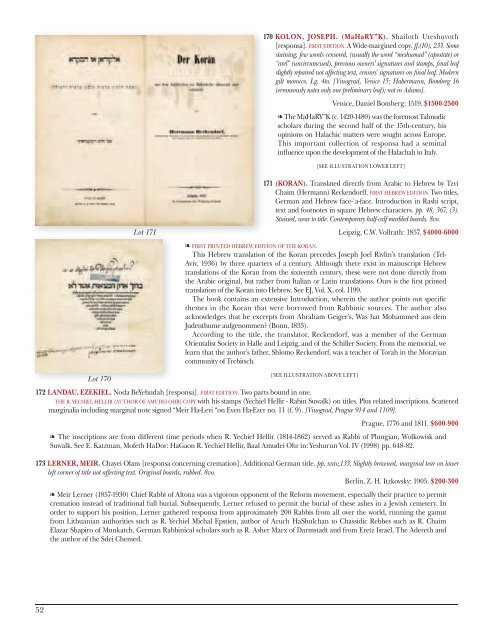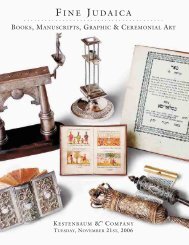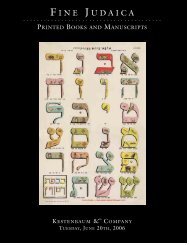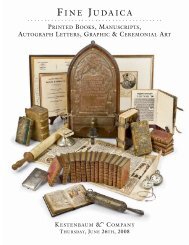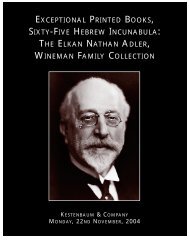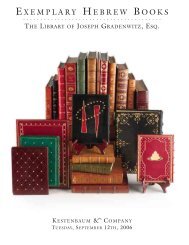Auction 43 Catalogue - Kestenbaum & Company
Auction 43 Catalogue - Kestenbaum & Company
Auction 43 Catalogue - Kestenbaum & Company
Create successful ePaper yourself
Turn your PDF publications into a flip-book with our unique Google optimized e-Paper software.
52<br />
Lot 170<br />
Lot 171<br />
170 17 KOLON, JOSEPH. (MaHaRY”K). Shailoth Uteshuvoth<br />
[responsa]. FIRST EDITION. A Wide-margined copy. ff.(10), 233. Some<br />
staining, few words censored, (usually the word “meshumad” (apostate) or<br />
“arel” (uncircumcised), previous owners’ signatures and stamps, fi nal leaf<br />
slightly repaired not affecting text, censors’ signatures on fi nal leaf. Modern<br />
gilt morocco. Lg. 4to. [Vinograd, Venice 15; Habermann, Bomberg 16<br />
(erroneously notes only one preliminary leaf); not in Adams].<br />
Venice, Daniel Bomberg: 1519. $1500-2500<br />
❧ The MaHaRY”K (c. 1420-1480) was the foremost Talmudic<br />
scholars during the second half of the 15th-century, his<br />
opinions on Halachic matters were sought across Europe.<br />
This important collection of responsa had a seminal<br />
infl uence upon the development of the Halachah in Italy.<br />
[SEE ILLUSTRATION LOWER LEFT]<br />
171 17 (KORAN). Translated directly from Arabic to Hebrew by Tzvi<br />
Chaim (Hermann) Reckendorff. FIRST HEBREW EDITION. Two titles,<br />
German and Hebrew face-`a-face. Introduction in Rashi script,<br />
text and footnotes in square Hebrew characters. pp. 48, 367, (3).<br />
Stained, wear to title. Contemporary half-calf marbled boards. 8vo.<br />
Leipzig, C.W. Vollrath: 1857. $4000-6000<br />
❧ FIRST PRINTED HEBREW EDITION OF THE KORAN.<br />
This Hebrew translation of the Koran precedes Joseph Joel Rivlin’s translation (Tel-<br />
Aviv, 1936) by three quarters of a century. Although there exist in manuscript Hebrew<br />
translations of the Koran from the sixteenth century, these were not done directly from<br />
the Arabic original, but rather from Italian or Latin translations. Ours is the fi rst printed<br />
translation of the Koran into Hebrew. See EJ, Vol. X, col. 1199.<br />
The book contains an extensive Introduction, wherein the author points out specifi c<br />
themes in the Koran that were borrowed from Rabbinic sources. The author also<br />
acknowledges that he excerpts from Abraham Geiger’s, Was hat Mohammed aus dem<br />
Judenthume aufgenommen? (Bonn, 1833).<br />
According to the title, the translator, Reckendorf, was a member of the German<br />
Orientalist Society in Halle and Leipzig, and of the Schiller Society. From the memorial, we<br />
learn that the author’s father, Shlomo Reckendorf, was a teacher of Torah in the Moravian<br />
community of Trebitsch.<br />
[SEE ILLUSTRATION ABOVE LEFT]<br />
172 LANDAU, EZEKIEL. Noda BeYehudah [responsa]. FIRST EDITION. Two parts bound in one.<br />
THE R. YECHIEL HELLIR (AUTHOR OF AMUDEI OHR) COPY with his stamps (Yechiel Hellir - Rabin Suwalk) on titles. Plus related inscriptions. Scattered<br />
marginalia including marginal note signed “Meir Ha-Levi “on Even Ha-Ezer no. 11 (f. 9). [Vinograd, Prague 914 and 1109].<br />
Prague, 1776 and 1811. $600-900<br />
❧ The inscriptions are from different time periods when R. Yechiel Hellir (1814-1862) served as Rabbi of Plungian, Wolkowisk and<br />
Suwalk. See E. Katzman, Mofeth HaDor: HaGaon R. Yechiel Hellir, Baal Amudei Ohr in: Yeshurun Vol. IV (1998) pp. 648-82.<br />
173 LERNER, MEIR. Chayei Olam [responsa concerning cremation]. Additional German title. pp. xxiv,133. Slightly browned, marginal tear on lower<br />
left corner of title not affecting text. Original boards, rubbed. 8vo.<br />
Berlin, Z. H. Itzkovsky: 1905. $200-300<br />
❧ Meir Lerner (1857-1930) Chief Rabbi of Altona was a vigorous opponent of the Reform movement, especially their practice to permit<br />
cremation instead of traditional full burial. Subsequently, Lerner refused to permit the burial of these ashes in a Jewish cemetery. In<br />
order to support his position, Lerner gathered responsa from approximately 200 Rabbis from all over the world, running the gamut<br />
from Lithuanian authorities such as R. Yechiel Michal Epstien, author of Aruch HaShulchan to Chassidic Rebbes such as R. Chaim<br />
Elazar Shapiro of Munkatch, German Rabbinical scholars such as R. Asher Marx of Darmstadt and from Eretz Israel, The Adereth and<br />
the author of the Sdei Chemed.


